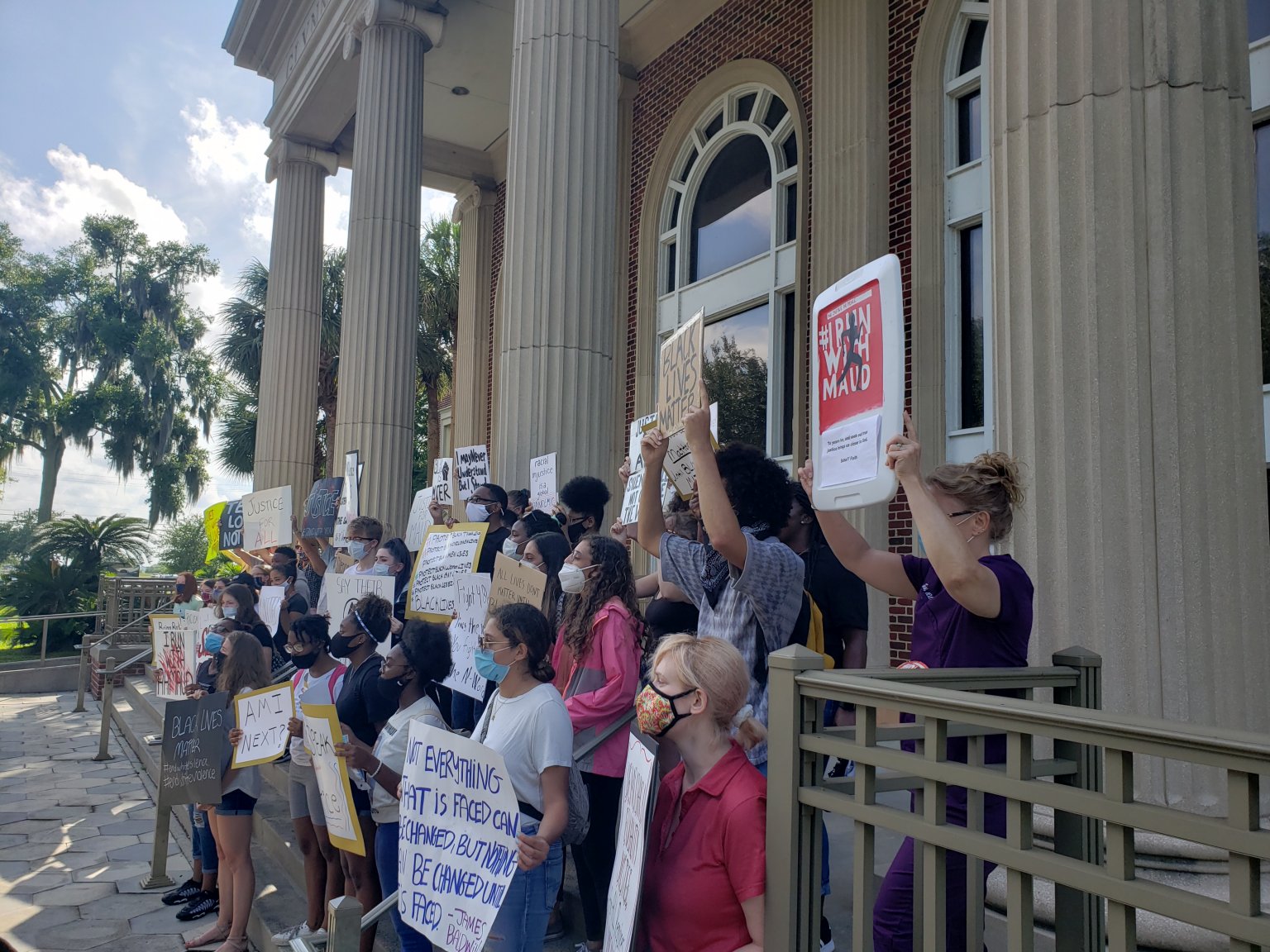
BRUNSWICK – Ahmaud Arbery’s killer used an obscenity and a racial slur after killing the 25-year-old Brunswick man with a shotgun last February, according to one of his co-defendants.
That was the testimony of Georgia Bureau of Investigation Special Agent Richard Dial at a hearing Thursday before a magistrate judge sent the murder charges against Travis McMichael, 34, Greg McMichael, 64, and Roddie Bryan, 50, to Glynn County Superior Court.
Dial’s testimony that Travis McMichael uttered the epithet moments after shooting Arbery comes as protests against police brutality in metro Atlanta and beyond roiled Georgia the last week. Hundreds of demonstrators turned out for tense yet peaceful rallies at the downtown Brunswick courthouse Thursday.
Three white men are charged with murder in the death of Ahmaud Arbery as he jogged through the Satilla Shores neighborhood on a late Sunday afternoon in February. Bryan recorded a now famous video that shows Travis McMichael shooting Arbery.
“On Feb. 23 of 2020, the victim, Ahmaud Arbery, was chased, hunted down and ultimately executed at the hands of these men,” said Jesse Evans, the lead prosecutor assigned to the case by the Cobb County district attorney. “He was on a run on a public roadway, in a public subdivision. He was defenseless and he was unarmed. Arbery, the evidence has shown, was shot down, unarmed and in broad daylight, in this quiet neighborhood.”
Dial said Arbery walked into an unfinished house on Satilla Drive which caused a neighbor to call 911. Greg McMichael, working in his yard, saw Arbery, and armed himself with his county-issued revolver from his days as a Glynn County police officer, and told his son to grab a gun as well.
Travis McMichael drove the pickup truck along with a shotgun, while Greg McMichael rode in the passenger seat. They didn’t call 911 before chasing after Arbery.
According to Dial, Bryan used his pickup truck to work in concert with the McMichaels to try to pin-in Arbery. After some extensive maneuvering by both Bryan and the McMichaels, they do exactly that.
Arbery, seeing the McMichaels coming from one direction, runs past Bryan’s truck, with the McMichaels and ultimately Bryan in pursuit. Once the McMichaels pass Arbery, Travis McMichael stops the truck, gets out and points his shotgun in what Dial called a firing stance, and shoots Arbery three times, killing him.
Bryan’s lawyer, Kevin Gough, challenged Dial’s account that his client had a racist motivation that caused him to pin down Arbery before he was killed.
“There is evidence of Roddie Bryan’s racist attitude in his communications, and from that, I extrapolate the reason why he made the assumptions he did that day of what was occurring,” Dial said. “He saw a man running down a road with a truck following him, and I believe he made certain assumptions that were at least in part based on his racial bias.”
He said a search of Bryan’s phone revealed comments by him in which he used racist, derogatory terms. Dial said earlier in the day that Travis McMichael’s social media activity showed a tendency on his part to use racist language.
Jason Sheffield, one of Travis McMichael’s lawyers, said his client wanted to stop and talk with Arbery, and when he got out of the truck, Arbery ran at him and caused him to fear for his safety.
“Mr. Travis McMichael used self-defense when he was attacked by Mr. Arbery,” Sheffield said.
Franklin Hogue, Greg McMichael’s lawyer, suggested the case go before a grand jury.
Following the hearing, rallies on the lawn of the historic Glynn County Courthouse and another a block away called for justice and peace. Both featured speakers demanding justice for Arbery, but other black Americans who’ve died in altercations with police. In a recurring theme, they called for removing Jackie Johnson as the Brunswick Judicial Circuit district attorney.
Zerik Samples, chief development officer with the Coastal Georgia Area Community Action Authority, opened his remarks by referencing a book published in 2000 that documented lynchings over nearly 70 years, up to 1950. The book went over more than 3,000 killings that were documented not only on paper, but in photographs.
“The author, James Allen, wrote, right before he put on his autograph to the owner of the book, he says, ‘A tragic tale without an end. What will it take?’” Samples said. “It takes a just justice system. We have to ensure that laws are in place that no other child should be lynched like Ahmaud Arbery. We must make sure that more individuals with humanity become the system.
“Right now, we need to be preparing our next generation of leaders for the election in 2022 and 2024 to take office. But most of all, my brothers and my sisters, we have to get to really learn each other, and to know each other on a personal level. Because when we become personal friends, true brothers and true sisters, we can truly have liberty and justice for all.”






